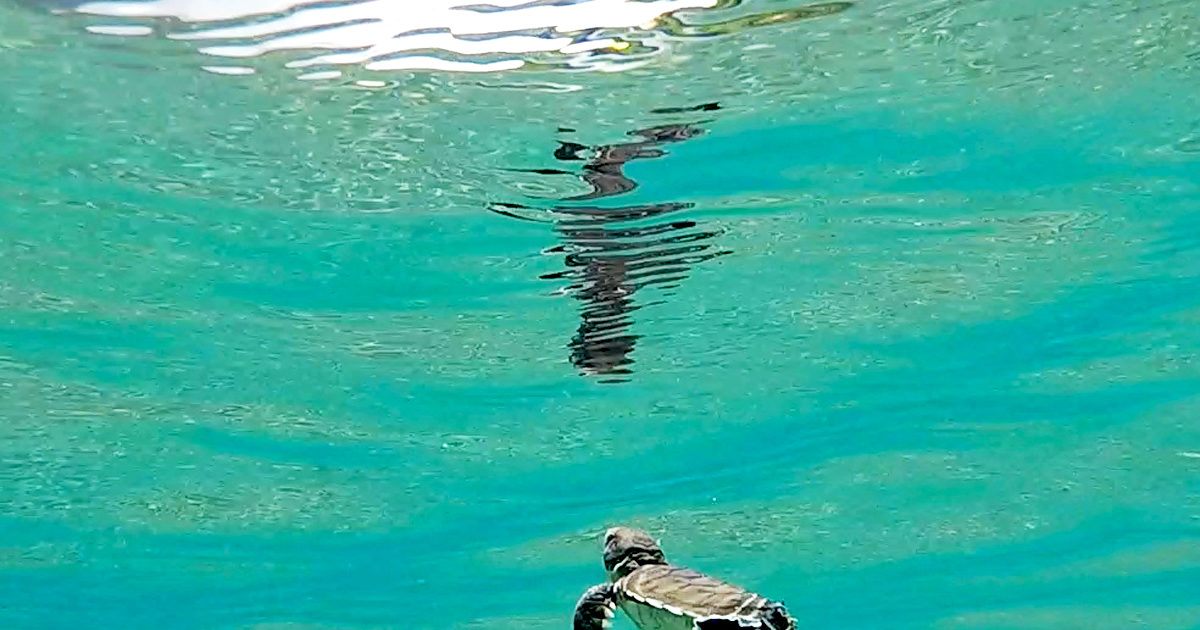Príncipe Island: a zero capture sanctuary for marine turtles
By: Estrela Matilde, Executive Director, Fundação Príncipe Trust
The Democratic Republic of São Tomé and Príncipe consists of two small oceanic islands located in the Gulf of Guinea, about 220km off the coast of Central Africa. São Tomé and Príncipe has about 179,000 inhabitants with a population density unevenly split between islands (Príncipe only has 7,500 inhabitants). Despite its small size, Príncipe is leading the country in conservation and sustainable development. Initially with the recognition of the island as a UNESCO Biosphere Reserve in 2012, there have been several efforts since to protect the islands’ unique and pristine biodiversity and to support the economic and social development of their communities. The conservation and protection of marine turtles is one of the Islands’ flagship examples of integrated community work to protect species. Príncipe Island is fortunate to be home to 5 of the 7 species of sea turtles in its surrounding waters, with 3 species nesting on our beaches: Hawksbill (Eretmochelys imbricata), Leatherback (Dermochelys coriacea) and Green Turtle (Chelonia mydas). In 2009, five years before a national law was passed, Príncipe Island, an Autonomous Region, launched regional legislation prohibiting the hunting and marketing of turtle meat and shells. Government efforts to protecting these species was further supported with the National Decree-Law released in 2014. However, despite various efforts to provide this species with adequate protection, illegal catch, both at sea and on spawning beaches, is still a concern today.
Fundação Príncipe Trust – FPT is a local NGO working to ensure both the culture and biodiversity of Príncipe is protected. Supporting the Regional Government’s strategy to protect marine turtles on the island, FPT’s conservation project has been in place since 2012. The project team includes 10 local marine and beach guards, who patrol the island’s seas, both by boat and on land, controlling poaching of turtles, and other marine fauna. During the turtle nesting season, 22 additional guards are hired to ensure all beaches on the island are patrolled. The FPT team monitors the turtles all year, collecting nesting data, tagging females and recording their behavior. This information is shared with partners working on turtle conservation throughout Africa, contributing to a global strategy to protect these species effectively. The majority of FPT guards were former turtle hunters, but today work to protect them, fearlessly and passionately. In a partnership with an international team of researchers, FPT is also involved in a project to develop tagging technology to improve the conservation of this species worldwide.
Besides research and patrolling, FPT initiated an environmental awareness campaign called Zero Capture. Several awareness materials were produced to raise understanding of the species’ threats and conservation, disseminated to all of the islands’ 10 schools, in fishing communities and the city, reaching more than 1800 children. With medium-long term goals and in close cooperation with the Regional Government and other relevant stakeholders, the objective was to raise public awareness about the importance of protecting sea turtles.
Involvement of island communities in marine conservation and promotion of sustainable fisheries has been essential to FPT’s progress. To provide local benefits, a community competition was initiated in 2016, involving all fishing communities. All funds received from tourist visitors to the nesting beaches and the Turtle Museum are allocated to a community fund. The communities that illustrate sustainable and responsible behaviors, working to protect the turtles, and those communities which are FPT partners, then decide on what the community funds will be spent on. Last year, the winning communities choose to improve their fishing gear, fix their community water fountain and to buy salt. Through this approach, the communities benefit directly from their actions to protect the turtles, and realise the genuinely higher value of keeping the turtles alive, as opposed to trading them for meat or shells.
Whilst the records of turtle poaching in Príncipe are not yet accurate (many instances are still not discovered) and unavoidable circumstances have contributed to spurts of high poaching numbers over the years, FPT’s work is showing signs of promise in reducing poaching (with recorded numbers for this last season being the lowest yet), by continuing to build a strong working relationship with the regional Government and the coast guards. In 2017, over 2000 turtle nesting instances (including attempts) were recorded since the beginning of the breeding season; and 16 of the 54 sea turtles captured by poachers were released back to the sea alive. In 2018, FPT will continue to build partnerships with island hotels and provide training for their staff and the wider guarding teams, in order to work together as part of the solution.
Article edited by: Nafeesa Esmail





